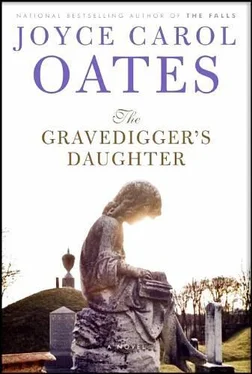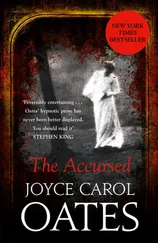She heard herself ask if the young people would like something to drink? Cola, coffee…
Politely they declined, no.
The terrible thought came to Hazel They are waiting for me to leave them alone .
Yet she heard herself ask, “This sonata, what is it like? Is it-familiar? Something I’ve heard?”
Frieda was the one to answer, bright and enthusiastic as a schoolgirl: “It’s a beautiful sonata, Mrs. Gallagher. But you probably haven’t heard it, Fauré‘s sonatas aren’t very well known. He was old and sick when he wrote it, in 1921, it’s one of his last compositions but you would never guess! Fauré was a true poet, a pure musician. In this sonata there’s a surprise, the way the mood shifts, the ”funeral theme’ becomes something you wouldn’t expect, almost ethereal, joyous. Like, if you were an old man, and sick, and soon to die, still you could lift yourself out of your body that is failing you…“ The girl spoke with such sudden intensity, Hazel felt uneasy.
Why is she talking to me like this, does she believe that I am old? Sick?
As it had been Hazel’s custom to place flowers on the Steinway grand piano in the display window at Zimmerman Brothers, so it was Hazel’s practice to place flowers on the piano in the music room. Zack took no notice of course. In the Gallagher household Zack seemed to take notice of very little, only music fully absorbed him. But his friend would notice the flowers. Already she had noticed. She had noticed the polished hardwood floor, the scattered carpets, the brightly colored pillows arranged on the window seat, the tall windows overlooking the vividly green back lawn where in wet weather (it was raining now, a fine porous mist) the air glowed as if undersea. Brought into the house and led through the downstairs by Zack she would certainly have noticed how beautifully furnished the Gallaghers’ house was. She would go away marveling Zack’s mother is so …
Hazel stood forlorn, uncertain. She knew she should leave the young musicians to their practice but another time she heard herself ask if they needed anything from the kitchen and another time they politely declined no .
As Hazel left, Frieda called after her, “Mrs. Gallagher, thanks! It was so nice to meet you.”
But you will meet me again won’t you? You will .
Yet Hazel lingered outside the door of the music room, waiting for the practice to begin. The cellist tuned her instrument: Zack would be seated at the piano. Hazel felt a pang of envy, hearing the young musicians begin. The cello was so rich, so vivid: Hazel’s favorite instrument, after the piano. She much preferred the cello to the violin. After a few bars, the music ceased. They would return to the beginning. Zack played, the girl listened. Zack spoke. Another time they began the sonata, and another time ceased. And another time began…Hazel listened, fascinated. For here was beauty she could comprehend: not the thunderous cascading of piano notes that left the listener breathless, not the strongly hammered repetitions, the isolation of the great Beethoven sonata but the more subtle, delicately entwined sounds of two instruments. The cello was predominant, the piano rather muted. Or so Zack chose to play it. Twined together, cello and piano. Hazel listened for some time, deeply moved.
She went away. She had work to do. Elsewhere in the house, her own work. But she could not concentrate, away from the music room. She returned, lingering in the hall. Inside, the young musicians were talking together. A girl’s quick robust laughter. A boy’s low-pitched voice. Was the practice over for the day? It was nearing 6 P.M. And when would they practice again? On the other side of the door, the youthful voices were animated, melodic. Zack’s voice was so warmly entwined with the girl’s, they were so at ease together, as if they spoke together often, laughed together. How strange: Zack had become wary with Hazel, guarded and reticent. She was losing him. She had lost him. It was very recent in her memory, when Zack’s voice had changed: his voice that had been a child’s thin high-pitched voice for so long. Even now sometimes it wavered, cracked. He was not yet a man though no longer a boy. Of course, a boy of seventeen is sexually mature. A girl of Frieda’s type, full-bodied, sensual, would have matured sexually at a much younger age. Hazel had not seen her son naked in a very long time nor did she wish to see him naked but she had occasional glimpses of coarse dark hair sprouting in his armpits, she saw that his forearms and legs were covered in dark hairs. The girl would be less of a stranger to Hazel than Zack: for the girl’s body would be known to her, familiar as her own lost girl’s body.
Frieda must have been answering a question of Zack’s, she was speaking now of her family. Her father was an eye surgeon in Buffalo, he’d been born in that city. Her mother had been born in a small German village near the Czechoslovakian border. As a girl she’d been transported to Dachau with all of her family, relatives, neighbors but later she was reassigned to a labor camp in Czechoslovakia, she’d managed to escape with three other Jewish girls, she’d been a “displaced person” after the liberation and she’d emigrated to Palestine and in 1953 she’d emigrated to the United States, aged twenty-five. The Nazis had exterminated all of her family: there was no one remaining. But she had this belief: “There should be some reason why she survived. She really believes it!” Frieda laughed to show that she understood that her mother’s belief was naive, she wished to dissociate herself from it. Zack said, “But there was, Frieda. So that you can play Fauré‘s second sonata, and I can accompany you.”
Hazel went away from the music room feeling as if her soul had been annihilated, extinguished.
So lonely!
She could not cry, there was only futility in crying. With no one to witness, a waste of tears.
Made your bed now lie in it .
Made your bed your bed . Now lie in it, you !
The coarse, crude voices of her childhood. The old voices of wisdom.
On the third floor of the house in the sparely furnished attic space that had become Hazel’s private space she hid away like a wounded animal. At this distance she could not hear if the young couple resumed their practice. She could not hear when the girl left. She could not hear if Zack left with her. If he’d called out to her on his way out of the house, she had not heard. If the girl called out to her in that warm penetrating voice Goodbye Mrs . Gallagher! she had not heard.
Never what you’ve told yourself . Never escaped from him . Pa was too smart, and too quick . Pa was too damned strong . Aimed the shotgun at your scrawny girl-chest and pulled the trigger. And that was it . And afterward turning from what lay bleeding and mangled on the bedroom floor like a hunk of butchered meat triumphant his enemies would not subdue and humiliate him another time he reloaded the shotgun that like the console model Motorola radio was one of the astonishing purchases of his American experience awkwardly he turned both barrels on himself and fired and in the aftermath of that terrible blast there was only silence for no witness remained .
Laugh at death . Why not and yet he could not bring himself to laugh.
The earth’s soil was steeped in blood. He knew, before he’d met Frieda Bruegger. He knew of the Nazi death camps, the Final Solution. Seemed already to know what he might spend years learning. Laugh at death was not possible this side of death.
How airy, how ephemeral and trivial music seemed, of all human efforts! Fading into silence even as it’s performed. And you had to work so very hard to perform it, and very likely you would fail in any case.
Читать дальше












